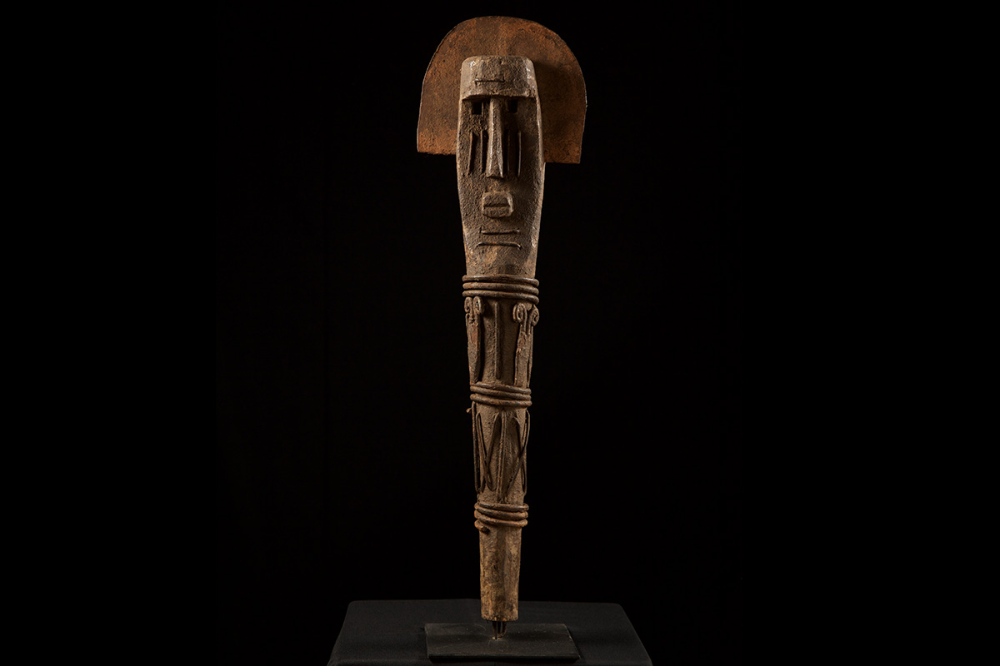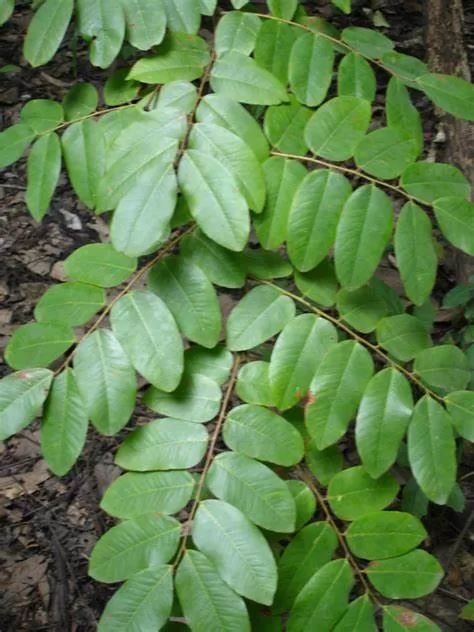With its rich cultural heritage and a strong emphasis on leadership, Igboland has always treasured the symbol of Ofo as a representation of authority and governance. This timeless emblem embodies the essence of leadership, justice, and community solidarity. More than just an object, the Ofo serves as a tangible manifestation of the Igbo people’s respect for leadership and the preservation of traditional values. Embedded in its intricate carvings are the stories of generations, reflecting the wisdom and guidance passed down through the ages.
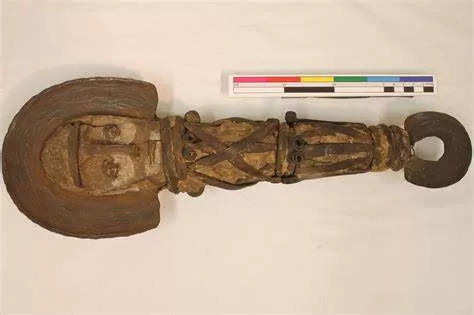
ofo symbol in igbo land
In this article, we delve into the profound symbolism of the Ofo in Igboland and its enduring relevance in contemporary society. From its historical roots to its contemporary significance, we uncover the multifaceted layers of meaning attached to the Ofo, shedding light on its continued reverence in Igbo culture. Join us as we explore the Ofo, an ancient symbol that continues to stand as a timeless representation of leadership and tradition in Igboland, challenging the colonialist notions that have fetishized the Ofo.
Historical Roots and Origins of the Ofo:
Crafted from the slender branches of the Detarium senegalese/elastica or Detarium guiniensis tree, known as ‘ukwu ofor’ in Igbo, the Ofo assumes a role akin to the mace or authority staff seen in National Assemblies worldwide. It stands as a potent emblem, symbolizing authority, justice, equity, and fairness, serving as the ultimate arbiter in the administration of justice and the judgment of the accused. Traditionally, the Ofo was the exclusive prerogative of the eldest member in a clan or community, holding it as a symbol of wisdom and authority. Across Igbo communities, the judgment pronounced by an Ofo bearer was accepted as an unwavering truth.
The resonating phrase “Ofor na Ogu” echoes through the ages among the Igbo people, even as the true essence faces the threat of extinction due to the impact of colonialism and the aftermath of the Nigerian/Biafran Civil War. This phrase finds embodiment in a symbolic staff called the Ofo, consisting of the common Ofo and an additional element known as Ogu. Ogu is represented by a shorter stick, symbolizing honesty and innocence, while the longer Ofo epitomizes justice, fairness, and equity, serving as the enforcer of Ogu’s verdict. Together, they form the powerful Ofo, an emblem deeply woven into the fabric of Igbo tradition. Uttering the words “ejim ofor n’ogu aga” signifies a commitment to approach a matter with pure honesty and innocence, a plea for justice to prevail, showcasing the profound dedication to straightforwardness ingrained in Igbo heritage.
Scholars hold diverse perspectives on Ofo, with Meek (1937) considering it a symbol of ancestors among the Igbo. The colonial definition emphasized Ofo as the status of its potential holders, serving as a guardian of moral codes in native courts and political organizations. Post-colonial indigenous scholars, including Arinze (1970), Ilogu (1964), and Onwuejeogwu (1981), view Ofo as a spiritualized socio-political symbol of leadership, authority, truth, and justice within Igbo traditional religion and political structures. Regardless of these variations, all scholars unanimously agree that Ofo represents truth, justice, and authority.
The uncertainty surrounding the origin of Ofo in Igbo traditional society is as old as Chukwu, the great God, who, according to belief, bestowed Ofo upon the Igbo people for the administration of justice. Ofo, in Igbo culture, serves as the sacred link between the living, the dead, gods, and ancestors, reserved exclusively for men, as women are forbidden from its usage.
Symbolism and Spiritual Significance of the Ofo:
The Ofo, is a symbol that embodies both tangible and mystical qualities, signifying truth, purity, justice, and authority. In the cultural tapestry of the Igbo people, the Ofo emerges as a sacred emblem, a symbol deeply interwoven with spiritual significance and moral authority. Entrusted exclusively to the eldest member of a clan or community, the Ofo bestows upon them a profound role as a sagacious guardian and the ultimate arbiter of moral principles.
The Ofo is not a mere physical object; it transforms into a revered source of wisdom, embodying the ethical foundations that guide the community. This symbolism is classified into tangible and intangible Ofo, each reflecting its unique manner of usage.
The tangible Ofo encompasses physical Ofo trees and their branchlets, considered sacred and symbolic. The trees, including Detarium Senegalense and Detarium Elastica, hold strict taboos, reinforcing their sanctity. Not limited to wood, some Ofos are crafted from bronze and iron, emphasizing the cultural significance lies in consecration and ritualization.
On the other hand, the intangible Ofo represents the power of spoken words, embodying justice and righteousness in daily life. Naming conventions, such as Ejimofo(I hold justice) and Ofoka(Justice prevails), reflect the deep-rooted value placed on justice. Scholars further classify Ofo into personal, institutional, titular, lineage, professional, and spiritual types, showcasing its diverse roles in connecting individuals to their ancestry and communities.
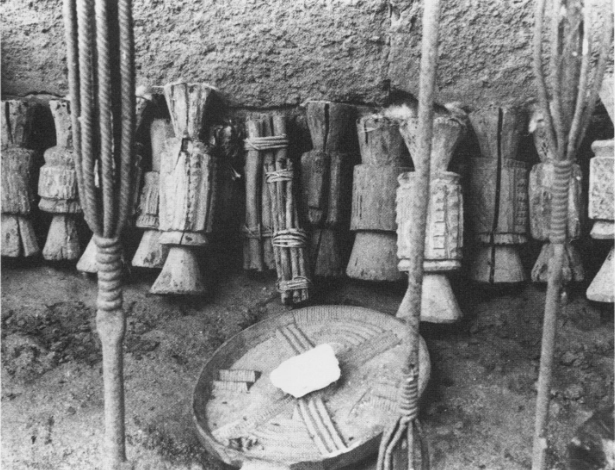
A shirine where Ofo is kept.
Picture a scene within an Igbo community, where a dispute hangs in the air, threatening harmony. The accused stands before the assembly, awaiting judgment. In this solemn moment, the sacred Ofo, held by the eldest or chief priest, transforms into a divine mediator.
Raised high, the Ofo becomes a conduit to ancestral spirits, embodying justice and righteousness. It takes on the role of both judge and enforcer, actively weaving unity and reverence within the community. When used to stamp rules, the Ofo symbol becomes a visible reminder of the community’s commitment to fairness and justice, guarding the moral code that governs interactions.
In essence, the Ofo symbol in Igbo culture is more than an arbiter; it is a revered embodiment of justice, fairness, and equity, weaving a spiritual thread that connects the living, the departed, the divine, and ancestral spirits. As the Ofo stands as a guardian in matters of order, it underscores the community’s dedication to upholding traditions and fostering equity in every facet of communal life.
Ofo in Igbo Rituals and Ceremonies:
Beyond its role in delivering judgments, the Ofo symbol emerges as a potent tool, shaping rules, maintaining order, and upholding the pillars of straightforwardness, equity, and justice within the Igbo community. This sacred staff, imbued with ancestral authority, transcends mere spiritual guidance to become a tangible force enforcing fundamental principles.
In various Igbo rituals and ceremonies, the Ofo holds a central position, symbolizing authority and serving as a conduit for divine guidance. Its significance permeates daily practices, where it marks the beginning of each day through prayer rituals involving kola nuts, alligator pepper, Nzu, and palm wine. Furthermore, the Ofo is a key element in oath-taking, a solemn act underscoring the gravity and truthfulness of one’s statements, functioning as a symbol of sacred prayer facilitating communication with unseen forces.
In the realm of dispute resolution, whether addressing minor family quarrels or major land conflicts, the Ofo serves as an insurance for truth, bringing resolution and harmony to opposing parties. This symbolic stick also plays a pivotal role in sealing covenants, such as blood covenants and traditional marriage agreements, signifying the profound commitment involved. The Ofo emerges as a powerful tool in decision-making within families, kindreds, and lineages, contributing significantly to the maintenance of peace and harmony in the community.
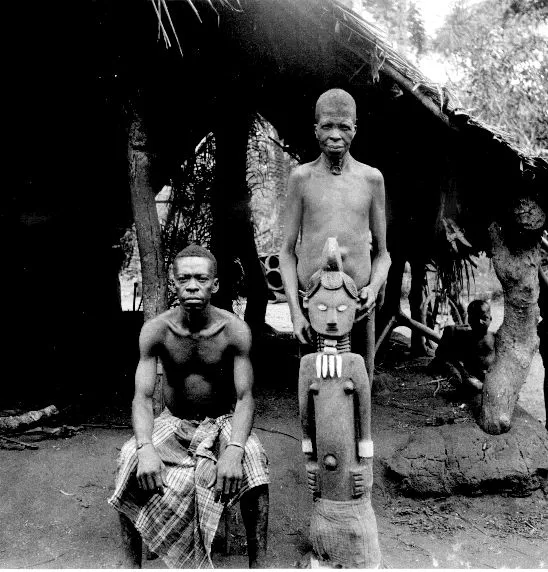
Ofo in Igbo Rituals
The magico-religious applications of specific types of Ofo, such as Ofo-Anunu_Ebe, Ofo-Atu, and Oke-Ofo, involve actions associated with causing harm, including curses against targeted individuals. These instances highlight the mystical power attributed to the Ofo in specific cultural contexts. Moreover, the Ofo finds utility in diverse cultural practices, ranging from naming ceremonies to ritual sacrifices and the affirmation of moral uprightness, showcasing its multifaceted significance in Igbo traditions.
In this broader role, the Ofo transcends being a static symbol; it becomes a dynamic force for maintaining the integrity of the community. It stands not merely as an emblem but as an active agent, ensuring that the principles of straightforwardness, equity, and justice are intricately woven into the fabric of daily life. The Ofo, with its dual role of spiritual significance and practical application, emerges as a timeless symbol embodying the enduring values that guide and shape the Igbo people.
Preservation Challenges and Threats:
The cultural legacy embodied in the Ofo symbol faces a looming threat of extinction, intensified by the enduring impacts of colonialism and the Nigerian/Biafran Civil War. Safeguarding and passing down the cultural knowledge embedded in Ofo become crucial for its continued relevance among future generations.
Research conducted in 2010 revealed a concerning decline in the tangible Ofo’s existence, contrasting with the persistence of intangible Ofo usage. Influences of colonialism, Western religion, and acculturation have contributed to the tangible Ofo’s diminishing presence. Negative perceptions labeling Ofo as a cult symbol within Igbo Christian communities further marginalize its cultural significance, fueled by scholars like Basden, Jeffrey, Nwaorgu, and Sayce.
Ofoism, integral to Igbo religious democracy, has suffered under the weight of retrogressive Western and Christian influences, leading to the fading of names celebrating its virtues. Scholars’ remarks, particularly Sayce and Jeffrey, emphasize the challenges faced by the Ofo symbol, portraying a decline and devolution.
Despite these challenges, the global significance of studying Ofo as a cultural resource remains paramount. Its tangible and intangible aspects carry profound symbolic meanings that resonate across diverse cultures. The ritual consecration of Ofo underscores its sacred nature and role as a conduit for divine guidance.
Preserving Ofo encounters formidable challenges, necessitating concerted efforts to counteract colonial influences and misconceptions. Embracing Ofo as a symbol of authority, justice, and truth is essential for sustaining its legacy within Igbo culture. Recognizing the profound meanings embedded in the Ofo symbol on a global scale transcends cultural boundaries, contributing to the preservation of rich cultural heritages.
Read Also:
- Present Religious Practices That Are in Connection with Edo Worship in Nnewi
- The Significance & Importance Of Christmas
Nurturing the Essence of the Ofo Symbol for Generations to Come
The Ofo symbol emerges as more than a mere artifact; it is a reservoir of tradition, justice, and spirituality. However, the very essence of Ofo faces an imminent threat, a consequence of historical wounds inflicted by colonialism and the shadows cast by a tumultuous civil war.
The tangible Ofo, once a revered arbiter of justice in the hands of the eldest, now grapples with the erosion caused by external influences. Misconceptions labeling it as a cult symbol within Igbo Christian communities add to the challenges it confronts. Scholars’ narratives contribute to the marginalization of this cultural emblem, depicting a disheartening decline rather than an evolution.
Despite these adversities, the study of Ofo remains pivotal on a global scale. Its tangible and intangible facets convey profound meanings that resonate beyond cultural boundaries. The ritual consecration of Ofo, a sacred act performed by custodians, underscores its role as a conduit for divine guidance.
Symbolic in Mace, Informative, Artistic, Communicative, Demonstrative, and Knowledge aspects, Ofo communicates values, aesthetics, and knowledge within the Igbo cultural sphere. Preserving this symbol demands a concerted effort to counteract the influences of the past and dispel misconceptions.
Embracing Ofo as a symbol of authority, justice, and truth is not just a call to safeguard a cultural relic but an invitation to weave it into the fabric of contemporary life. As we delve into the rich meanings embedded in the Ofo symbol, transcending cultural boundaries, we contribute to the preservation of a heritage that transcends generations. In nurturing the essence of the Ofo symbol, we ensure that its sacred whispers continue to resonate for generations yet to come, connecting the past, present, and future in a harmonious thread of cultural continuity.
Follow us on Facebook
Post Disclaimer
The opinions, beliefs and viewpoints expressed by the author and forum participants on this website do not necessarily reflect the opinions, beliefs and viewpoints of Anaedo Online or official policies of the Anaedo Online.

